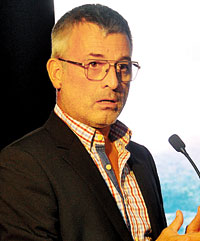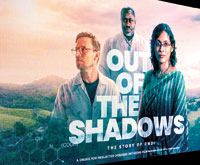News
Dengue needs a multi-pronged attack and not only vector control
View(s):- Experts focus on making SL dengue-free at discussion organised by DNDi, J’pura University & British Council
By Kumudini Hettiarachchi
While the COP28 UN Climate Conference now on in Dubai, the United Arab Emirates (UAE), is taking a closer look at the growing impact of climate change on human health, right here in Sri Lanka this week, top experts also focused on this crucial issue.
Even though the December 5th programme organised by the Drugs for Neglected Diseases initiative (DNDi); the University of Sri Jayewardenepura’s Faculty of Medical Sciences; and the British Council was titled ‘Dengue-Free Sri Lanka: An evening of collaboration’, the scope of discussions was much more.

Looking closely at Sri Lanka’s strategy of dealing with the mosquito-borne disease of dengue, a joint guru-gola (teacher-student) presentation by Prof. Neelika Malavige and Dr. Dinuka Ariyaratne, disclosed that the country’s major focus had been on vector control including fumigation and clean-ups.
Prof. Malavige is DNDi’s Head of the Dengue Global Programme and Professor, Department of Immunology and Molecular Medicine, Faculty of Medical Sciences, University of Sri Jayewardenepura. She had just returned from India after delivering the prestigious 12th Dr. Benjamin Pulimood Oration of the Department of Infectious Diseases and Internal Medicine of Vellore’s Christian Medical College on ‘Newer concepts in pathogenesis and treatment of dengue’ on December 1.
Dr. Ariyaratne, meanwhile, is a graduate student and lecturer at the Department of Immunology and Molecular Medicine.
Posing the all-important question whether Sri Lanka’s strategy has worked, the presentation looked at dengue, a “disease of urbanization” with a current “significant” caseload of close to 80,000 this year including 46 deaths. Dengue is more prevalent in the Western Province and specifically in the Colombo and Gampaha districts, when compared to other areas.
Every year, the dengue numbers are in their thousands and getting worse, partly driven by climate change. Climate change as a factor in dengue trends has been established due to countries in Europe never having dengue earlier, now reporting this disease, it is learnt.
The presentation also dealt with both the direct and indirect burden of dengue on the economy and went back to the question whether the vector control strategy alone being implemented over and over again was working.
It also referred to the use of the Wolbachia bacteria to block the virus spreading not only dengue but others causing Zika and chikungunya. Implemented as a pilot project in 2018 in the Colombo Municipal Council and Nugegoda areas, it had concluded in 2021. But a spike in dengue had been seen that year too.
While stressing the importance of using ‘a multi-pronged attack’ on all fronts against dengue, the presentation urged vector control as well as pursuing the development of proper diagnostic tools for dengue, biomarkers (an early warning) and strategies to implement effective vaccines and also a treatment.
The British Council’s Head of Programmes, Sanjeevani Munasinghe; the Vice Chancellor of the University of Sri Jayewardenepura, Prof. Pathmalal M. Manage; and the Dean and Professor in Paediatrics, Faculty of Medical Sciences, University of Sri Jayewardenepura, Prof. Manori Gamage also spoke. Dr. Sudath Samaraweera of the World Health Organization’s South-East Asia Regional Office (SEARO) was part of the panel
discussion.
| Coaxing neglected diseases ‘Out of the Shadows’ A screening of the powerful and moving DNDi documentary titled ‘Out of the Shadows’ was a highpoint of the evening. Filmed to mark DNDi’s 20th anniversary, it brought to light how “unique, not-for-profit drug development partnerships” have delivered new treatments for diseases such as sleeping sickness, saving millions of lives. It also turned the spotlight on the need to do more with regard to neglected diseases for the benefit of the vulnerable. ‘Starring’ in ‘Out of the Shadows’ is Sri Lanka’s Prof. Neelika Malavige and scientists from the Republic of Congo and Brazil looking at diseases such as dengue and chagas (caused by the parasite Trypanosoma cruzi) and efforts at discovering, developing and delivering cures for patients who have lived in the shadow for too long.  Jean-Michel Piedagnel  ‘Out of the Shadows’ Meanwhile, DNDi’s Director Southeast Asia, Jean-Michel Piedagnel, gave an insight on DNDi’s partnerships. He said that when Médecins Sans Frontières (MSF – Doctors Without Borders) won the Nobel Peace Prize in 1999, it dedicated a portion of the award to exploring a new, alternative, not-for-profit model for developing drugs for neglected patients. In 2003, five international research institutions teamed up with MSF and the World Health Organization Special Programme on Research and Training in Tropical Diseases (WHO/TDR) to found DNDi. These research institutions were the Indian Council of Medical Research (ICMR), the Oswaldo Cruz Foundation in Brazil, the Kenyan Medical Research Institute (KEMRI), the Malaysian Ministry of Health, and the Institut Pasteur of France. Since then, DNDi has grown, according to Mr. Piedagnel, with the best science being used for the most neglected patients. There has also been a turn of tables with endemic countries for particular diseases being given the lead, especially in the case of dengue by creating a dengue alliance. It is very basic and simple and it works. A unique aspect is sharing of valuable data. | |
The best way to say that you found the home of your dreams is by finding it on Hitad.lk. We have listings for apartments for sale or rent in Sri Lanka, no matter what locale you're looking for! Whether you live in Colombo, Galle, Kandy, Matara, Jaffna and more - we've got them all!

